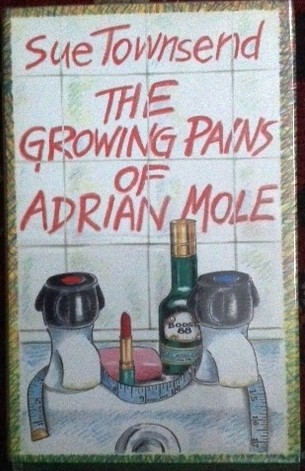Inspiring Young Readers
 posted on 24 Mar 2022
posted on 24 Mar 2022
The Growing Pains of Adrian Mole by Sue Townsend
This is the second instalment of the great diary of the quintessential British teenager, Adrian Mole, whose internal, angst-ridden monologues we first encountered in The Secret Diary of Adrian Mole, Aged 13¾.
Adrian is now 15 heading on 16 and he’s trying to come to terms with so many unfathomable things – his raging hormones, acne, school exams, girlfriends, parental break-ups, new babies and an outside world of politics which we know (with reader hindsight) is slipping towards the Thatcherite revolution.
Townsend’s superb skill is to make all of Adrian’s concerns immediately believable and to make us laugh at them – it might be the nervous laughter of recognition (maybe we’ve all shared some of the concerns Adrian is forced to confront) or the simple belly laughter of the absurd.
These diaries simply wouldn’t work if Adrian was simply absurd or risible – he isn’t. Not only is he a sort of teenage everyman, he’s also complex. True, he’s bumptious, self-regarding, unworldly and definitely not one of the cool kids but he’s also compassionate and considerate, has a moral compass and desperately wants to be better than he is.
Characteristically, he writes poetry – often very bad poetry – but he believes in it and it is important to him despite the repeated rejections he gets. This boy sets himself up to be knocked down – often to our great amusement – but he always gets back up.
But Adrian’s diaries aren’t just a window on the teenage world – they also give us an often piercing view of the foibles and absurdities of the adult world. To say that Adrian’s family is dysfunctional is something of an understatement – his mother, who is busy discovering feminism, becomes pregnant only to discover that his father’s erstwhile dalliance, the Stick Insect, as Adrian calls her, is also expecting a child. The hapless father finds himself bouncing backwards and forwards between the two women, seemingly making everything considerably worse wherever he goes.
The old people in this book are also not necessarily wise and comforting. The irascible, incontinent and infirm pensioner, Bert, who Adrian helps look after, and his wife Queenie and unpredictable Alsatian dog, Sabre, are both a comic and tragic presence while his Grandmother seems to offer him little love and affection.
As the 70s move towards their conclusion, the most telling part of the book covers the time that Adrian and his mother are forced to survive on social security benefits. The episode of the never arriving giro would be funny if it wasn’t so tragic but it says something about the general state of emotional chaos that Adrian lives in that it becomes just one more detail in a world that seems to be doing everything it can to thwart this teenager’s hopes and aspirations.
The best comic creations are not just recognisable to us as aspects of ourselves or those we are close to but have a darker underside of potentially tragic reality. Adrian Mole is funny to us for lots of reasons but sometimes that humour is uneasy because we have to also acknowledge that it’s because of his strong sense of decency, morality and youthful naivety that we keep coming back for more.
Terry Potter
March 2022